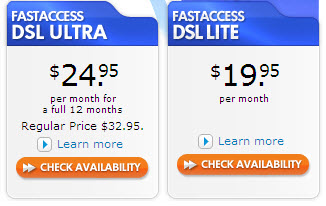Internet 101
How to Choose an Internet Service Provider
How to choose an Internet service provider
Internet service providers (ISPs) are companies that connect you to the Internet. There are various types of ISPs. In order to select the best ISP, you need to know what technology is available, which technology is right for you, how much speed you need, and what the service will cost.
What technology is available?
Most ISPs use either an existing phone line (for dial-up or DSL), a cable television line, or a satellite connection to connect you to the Internet. Depending on your area, some connections may not be available.
Review the following interactive to learn the differences between each type of connection so you'll know what type of ISP you are looking for.
What technology is right for you?
- Dial-up
If you only want to use the Internet every now and then, do not mind waiting a few minutes to connect and disconnect each time you want to use the Internet, and do not need wireless access, then dial-up may be right for you. Dial-up can also be a good option if you are traveling and want to occasionally check email or browse some webpages. Keep in mind that you need access to a land-line telephone service in order to use dial-up. - DSL or cable
If you regularly use the Internet, you will probably want a DSL or cable connection. Cable can be faster than DSL, but most people can find what they need from either one of these services. Also, if you want a reliable wireless connection, you can connect to DSL or cable internet wirelessly with a wireless router. - Satellite
If you regularly use the Internet but live in an area where DSL or cable connections are not available, a satellite connection may be your best option. Satellite connections are wireless and much faster than dial-up, and their prices are comparable to DSL and cable connections, but they are limited in their ability to connect to streaming content and can be affected by the weather.
Do you need a more portable option?
If you need portable Internet access for a mobile device such as a phone, tablet, or laptop, you will need an ISP that offers a service such as 3G, 4G, Wi-Fi, or Wi-Max. This would not typically be your primary method of connecting to the Internet; you should also have a dial-up, DSL, cable, or satellite connection.
How much speed do you need?
In most cases, the faster the Internet connection, the more you will pay for it. You only want to pay for the level of speed and performance that you will regularly use.
A slower connection (~56 Kbps) might be all you need for email and light browsing. You will need a fast connection (greater than ~1 Mbps) if you do a lot of browsing, download a lot of music, watch streaming videos, or if there are multiple people in your household using the Internet at the same time. The fastest connections (greater than ~3 Mbps) benefit serious gamers and users who are regularly sending and receiving large files.
 Increased Speed Option
Increased Speed OptionWhat about total cost?
There is no standard price for dial-up, DSL, cable, or satellite services. ISPs set prices based on the area, type of connection, speed of the connection, and what they think their own services are worth. Look around for the best deal.
Do you also need cable or phone service? Many ISPs give you a discount if you sign up for a package of their services. If you already use a cable or phone company, check to see what discounts are available if you add Internet to your existing services with them.
Make sure you factor in the terms of the contract when examining total cost. What is the period of time during which you must agree to be a customer? What is the penalty for terminating the service? If this is a promotional rate, how much will the cost increase when the promotional period is over? Choose an ISP that offers contract terms you are comfortable with.






